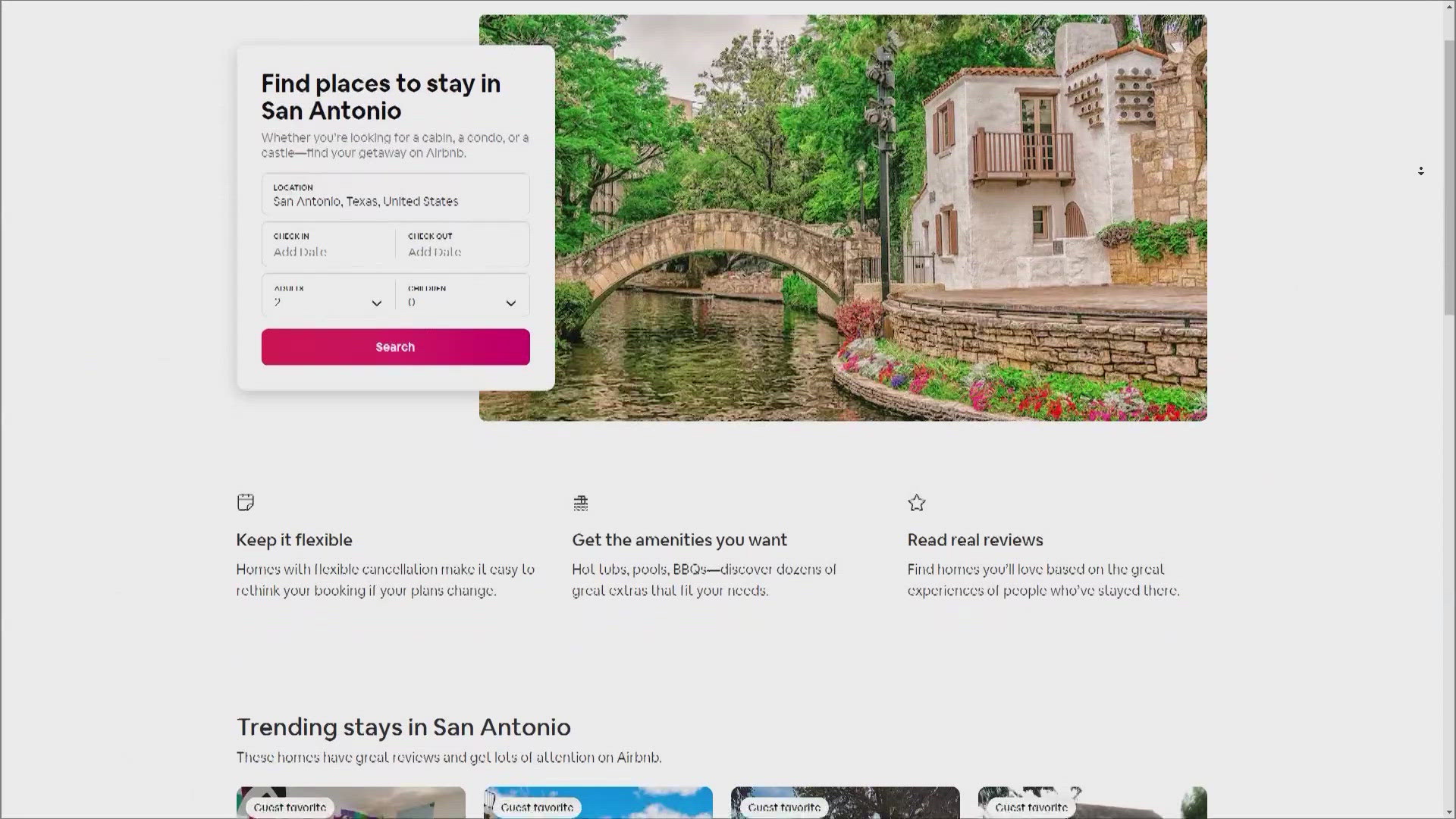SAN ANTONIO — As part of an effort to rein in "party houses" and increase the amount of money funneled directly to the city's coffers, San Antonio City Council on Thursday approved a laundry list of changes to its six-year-old law regulating short-term rentals like Airbnb and Vrbo.
The 9-0 vote (City Council members John Courage and Adriana Rocha Garcia were absent) also requires those owners to pay more for short-term rental (STR) permits. Whereas previously they paid $100 every three years – a rate that staff say was among the lowest for major Texas cities – now most rental property owners will have to pay $450 every three years.
That rate goes for Type 2 owners, referring to properties that aren't the host's primary residence. Type 1 properties, which are the host's primary residence, will have to pay a slightly lower new fee of $300 every three years.
About four out of every five STRs registered with the city fall into the Type 2 category. Councilman Jalen McKee-Rodriguez, whose district is home to about 20% of all STRs in the city, would have liked to see Type 2 fees raised even more, saying the low permit costs incentive corporations and deplete the local housing market.
"We need to make it less profitable for profit-seeking companies to take a scarce resource like housing and pimp it out as a small-scale hotel business instead of renting it to families in our community," McKee-Rodriguez said. "This issue makes clear who our constituency is.”
City staff who led efforts to come up with the proposed changes said the raised permit costs will help the Development Services Department recuperate annual costs as well as potentially hire a code enforcement officers who would respond to nuisance rental properties.
Currently, there is no such position in San Antonio.
Michael Shannon, Development Services Department director, said his office has received “a couple dozen” examples of complaints that rise to the level of categorizing them as party houses "over the last couple years."
“They really disrupt that neighborhood significantly, especially that block," he said Thursday. “I’m open to this code officer being where the enforcement is needed and when it’s needed.”
As of June 1 there are 3,164 STRs in San Antonio that have permits – the vast majority of them downtown and on the east side – in addition to others that don't have permits, which means they're operating illegally and potentially not paying Hotel Occupancy Tax, or HOT taxes.
Rental companies like Airbnb previously collected and provided HOT tax revenue only to the state. Now they'll be required to send them directly to the city too, a change which city leaders and residents alike said will help recuperate money it had lost out on.
“These changes will improve our neighborhoods, level the playing field for compliant short-term rental owners and secure the city’s rightful revenue," said Shelley Galbraith, chair of the Short-Term Rental Association of San Antonio.
Another newly adopted change to the city's rental property ordinance requires rental companies to remove listings that don't have city-issued permits, effectively cutting off business for them.
“If you don’t have a permit, you’re not paying your fair share of the city, county and state HOT tax, as well as some under-reporting from those that do pay," Shannon said.
The now-approved changes were the culmination of several meetings in recent months of a task force that included neighborhood and rental association members, as well as housing advocates. Shannon said the San Antonio Apartment Association, Hotel & Lodging Association and San Antonio Board of Realtors provided letters of support for the changes, but at least one local host had reservations.
“If I rent out my house to a guest that comes from a neighbor house – sometimes within the city – and they throw a party, it is not my responsibility," said Ruben Uribe, who spoke about the proposed changes during the public comment section of the meeting. "I’m not the one who threw the party. So I don’t know why these people are attacking us hosts.”
Another self-identified "superhost," Laurentiu Popa, told City Council he didn't think it was fair to increase permit fees before the city solved the problem of STR hosts who don't seek required permits at all.
The ordinance changes also require STR hosts to post quiet hours and meet with city staff if their properties are repeatedly called out in complaints.
>TRENDING ON KENS 5 YOUTUBE:

